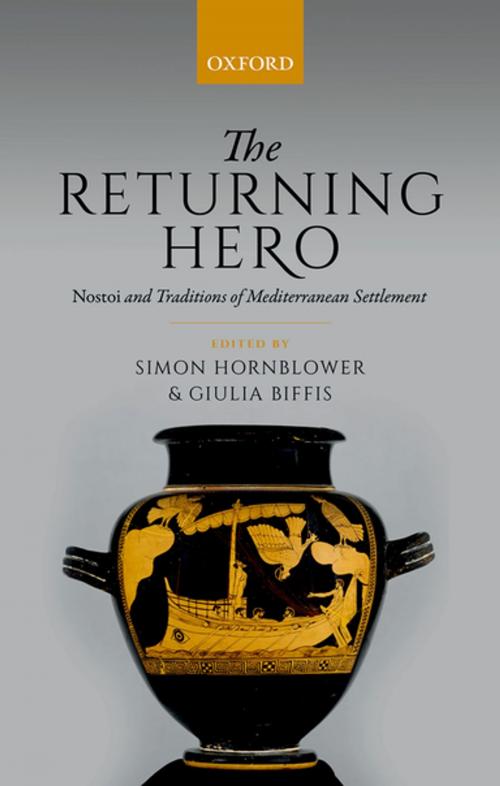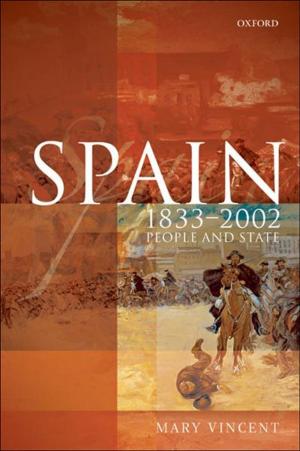The Returning Hero
nostoi and Traditions of Mediterranean Settlement
Fiction & Literature, Literary Theory & Criticism, Nonfiction, Social & Cultural Studies, Social Science, History| Author: | ISBN: | 9780192539427 | |
| Publisher: | OUP Oxford | Publication: | September 13, 2018 |
| Imprint: | OUP Oxford | Language: | English |
| Author: | |
| ISBN: | 9780192539427 |
| Publisher: | OUP Oxford |
| Publication: | September 13, 2018 |
| Imprint: | OUP Oxford |
| Language: | English |
A recurring and significant theme in ancient Greek literature is that of returns and returning, chiefly - but by no means only - of mythical Greek heroes from Troy. One main, and certainly the most 'marked', ancient Greek word for 'return' is nostos (plural nostoi), from which is derived the English 'nostalgia'. Nostos-related traditions were important ingredients of colonial foundation myths and the theme runs through both ancient Greek prose and poetry from Homer's Odyssey to Lykophron's Alexandra, also leaving traces in the historical record through the archaeological and epigraphical commemoration of nostoi, which played a central part in defining Greek ethnicity and crystallizing personal and communal identities. This volume offers a truly interdisciplinary exploration of the concept of nostos in ancient Greek culture, which draws on its contributors' expertise in ancient Greek (and Roman) history, literature, archaeology, and religion. The chapters examine both literary and material evidence in order to achieve a better understanding of the nature of Greek settlement in the Mediterranean zone, and of sometimes equivocal Greek and Roman perceptions of home, displacement, and returning. The special problems and vocabulary of exile are explored in the long Introduction, which offers an incisive yet accessible overview of the volume's key themes and sets its range of contributions clearly in context: while two chapters are concerned in different ways with emotions and personal identity, making use of the theoretical tool of place-attachment, another demonstrates that failed nostoi can be more interesting than successful examples. Evidential absence can be as important and illuminating as presence, and mythical women, underrepresented in this regard, feature extensively in several chapters, which open up a range of new perspectives on nostos.
A recurring and significant theme in ancient Greek literature is that of returns and returning, chiefly - but by no means only - of mythical Greek heroes from Troy. One main, and certainly the most 'marked', ancient Greek word for 'return' is nostos (plural nostoi), from which is derived the English 'nostalgia'. Nostos-related traditions were important ingredients of colonial foundation myths and the theme runs through both ancient Greek prose and poetry from Homer's Odyssey to Lykophron's Alexandra, also leaving traces in the historical record through the archaeological and epigraphical commemoration of nostoi, which played a central part in defining Greek ethnicity and crystallizing personal and communal identities. This volume offers a truly interdisciplinary exploration of the concept of nostos in ancient Greek culture, which draws on its contributors' expertise in ancient Greek (and Roman) history, literature, archaeology, and religion. The chapters examine both literary and material evidence in order to achieve a better understanding of the nature of Greek settlement in the Mediterranean zone, and of sometimes equivocal Greek and Roman perceptions of home, displacement, and returning. The special problems and vocabulary of exile are explored in the long Introduction, which offers an incisive yet accessible overview of the volume's key themes and sets its range of contributions clearly in context: while two chapters are concerned in different ways with emotions and personal identity, making use of the theoretical tool of place-attachment, another demonstrates that failed nostoi can be more interesting than successful examples. Evidential absence can be as important and illuminating as presence, and mythical women, underrepresented in this regard, feature extensively in several chapters, which open up a range of new perspectives on nostos.















